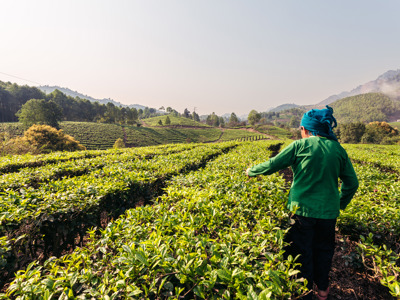
The role of the UN Guiding Principles on Business and Human Rights in protecting the most vulnerable: Operational Grievance Mechanisms for women in agribusiness
Melanie Jacques and Sarah Gibbons begin the International Day of Violence Against Women series with a focus on violence against women in the agricultural sector. They discuss the role of the UN Guiding Principles on Business and Human Rights as a tool for developing effective Operational Grievance Mechanisms as a means by which women can raise concerns and complaints about the human rights impacts of the operations in which they work.
Posted on 25 November 2024
This post contains themes of sexual harrassment and violence.
Violence against women in the agricultural sector
Women make up 43% of the global agricultural labour force, yet are disproportionately represented in informal, casual and part-time work. Plantation work in particular, which generally involves unskilled labour and tends to be temporary in nature, often creates a power imbalance between employers and employees. The result is an environment that is easily abused by male managers and supervisors, leaving women vulnerable to rape, sexual abuse and harassment.
Leigh Day’s international team has successfully represented female plantation workers around the world who have been subjected to gender-based-violence (GBV) and sexual abuse in the course of their employment on plantations.
A recent BBC Panorama investigation uncovered sexual abuse and exploitation on tea farms currently or formerly owned by British companies in Kericho, Kenya. The investigation revealed that women working on plantations producing tea for household names, including PG Tips and Lipton, were pressured to have sex with their bosses, in return for work or to keep their contract. Leigh Day is acting on behalf of over 80 former Unilever tea workers in relation to similar allegations.
Some of the accounts reported in the BBC programme echo many of the concerns raised by our clients as to the harassment to which they were subjected and the vulnerabilities they faced, and are representative of wider systemic issues across the agribusiness supply chain, and in the tea industry in particular.
Companies’ responsibilities to protect their female workers and prevent sexual violence in their operations
Agri-business companies must take the risks to their female employees seriously, and implement effective measures to ensure that their employees work free of harassment, abuse and discrimination. When they do not, the consequences can be devastating for the lives of some of the most vulnerable people in the world.
Such measures should include a dedicated operational grievance mechanism (OGM) to handle claims of sexual harassment and violence. Too often, the lack of adequate and effective grievance mechanisms not only deprives victims of GBV from access to a meaningful remedy, but also compounds the problem, by enabling perpetrators to escape responsibility and perpetuating systemic issues within the company.
UNGPs as a strategy to address GBV
When human rights abuses are connected to business activities, the UN Guiding Principles on Business and Human Rights (UNGPs) provide an important and authoritative framework for action on remedy. The UNGPs are a set of guidelines, aimed at both States and companies to guide responsible business conduct and address human rights abuses in business operations and global supply chains. The UNGPs should be the starting point for any company seeking to establish an effective grievance mechanism. Principle 31 in particular sets out eight criteria against which to assess the effectiveness of an OGM.
In our view, a UNGP-compliant, effective OGM is one which is both specific to the sector in which it operates, and the human rights impacts, real or potential, that it aims to address. As such, for an OGM operating in the agriculture sector to address concerns relating to GBV, it should be specific to this industry and have the needs and perspectives of women agricultural workers in its design, implementation and evaluation.
With this in mind, we have identified several key best practice measures that we consider are particularly relevant and important when designing and implementing a UNGP-compliant OGM to address claims of GBV in the agriculture sector. We consider them to fall broadly under three themes: Community and stakeholder participation, Independence, impartiality and due process and, Remedy and reforms of working practices.
Community and Stakeholder Participation
Guiding Principle 31 makes clear that consultation with affected communities on the design and implementation of an OGM is essential for the mechanism to be impactful and engender trust. Participation should be embedded in the development and design of the OGM to ensure its legitimacy.
A gender-sensitive OGM in agribusiness would mean that women employees are involved in defining its scope, including by identifying the harms they have or expect to suffer. There should be targeted consultation with women’s groups, workers’ representatives and other relevant stakeholders and should include consultation on issues such as access points and the roles of different parties in the investigations. Community participation is also key for the evaluation of an OGM, to ensure it meets their needs and expectations as rights-holders.
Independence, Impartiality and Due Process
In accordance with the UNGPs, any grievance mechanism should contain guarantees of independence, impartiality and due process. As such, an effective gender sensitive OGM will have clear procedures, timelines and communication of outcomes.
In cases of sexual assault and harassment, stigma and shame can mean women face additional barriers in accessing effective remedies and so suitable confidentiality and anonymity provisions are particularly critical.
Commonly, investigative teams within OGMs are internal to the company, rather than wholly independent of it. However, the risk of power imbalance is particularly high if those involved in the OGM are all employed or appointed by the company and in cases where perpetrators are from senior levels of the business. The role of independent investigators, monitors, senior lawyers and/or experts are therefore key to ensure trust in the process, minimize conflicts of interest and to provide independent legal advice where required.
Remedy and reforms of working practices
As the UN points out, ‘remedies can take a variety of forms and it is important to understand what those affected would view as effective remedy, in addition to [a company’s] own view’. As such, the types of remedy available should be informed by the community, and women’s groups, workers’ representatives and other relevant stakeholders should feed into the nature and type of remedies available. Nonetheless, access to appropriate psychological support can be vital for the recovery of survivors of GBV and referrals to suitable experts should be incorporated into the remedies offered.
The UNGPs make clear that grievance mechanisms should not only resolve individual claims; they should also allow businesses to ‘identify systemic problems and adapt their practices accordingly’. Any gender-sensitive OGM should therefore also be accompanied by reforms to the working environment that deal with gender inequality, improve women’s safety and provide genuine opportunities for advancement.
Reforms should include a package of measures, which in the short-term aim to improve the safety and security of female employees, including for example, the installation of security cameras in particularly remote areas, and the provision of personal attack alarms. These should be coupled with longer term measures that focus on behaviour change, including implementing polices and training on a zero tolerance to sexual harassment in the workplace. Furthermore, empowerment measures aimed to address the power imbalance in the sector should include skills training, increased wages, secure contracts and work to ensure greater representation of women at senior levels.
Conclusion
A company that fails to establish or participate in effective grievance mechanisms cannot claim to be meeting its corporate responsibility to respect human rights under the UNGPs and fails the women workers that are critical to operation. The solution lies in robust responses, gender-sensitive design, suitable remedy, and monitoring and investments in prevention.




